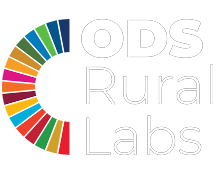Labs, Learning and Local Action: UNITA x ODS Rural Lab
¿Are you interested in promoting SDG in rural areas?
This article explores the synergies and potential for collaboration between the Social Innovation Laboratory for Rural Environments (ODS Rural Lab) of the University of Zaragoza and the European university consortium UNITA (Universitas Montium), with the aim of contributing to sustainable territorial development, intercultural learning, and knowledge transfer in rural contexts in Southern Europe and Latin America.
A university model for rural innovation based on the SDGs
The ODS Rural Lab is a participatory action research initiative promoted by the University of Zaragoza through the Chair of Development Cooperation, in partnership with the Provincial Council of Zaragoza (DPZ) and the Aragonese Federation of Solidarity (FAS). The project proposes a citizen laboratory model for social innovation, based on citizen science, participatory assessment, and community work, which allows for the identification, visibility, and support of local initiatives in line with the Sustainable Development Goals (SDGs).
Since its creation in 2019, laboratories have been implemented in more than seven territories—in Aragon, Latin America, and the Maghreb—linking the academic community, local stakeholders, public administrations, and citizens, and generating a methodological model transferable to other rural environments.
UNITA and the Rural Vocation of Southern European Universities
The UNITA–Universitas Montium consortium, of which the University of Zaragoza is a member, brings together universities from rural or mountainous regions in Spain, France, Italy, Portugal, Romania, and, recently, African and Latin American universities. The project is committed to the revitalization of rural territories from a perspective of sustainability, European cohesion, multilingualism, and digitalization, promoting academic mobility and intercultural learning.
Its strategic lines include sustainable development, the circular economy, intercultural dialogue, and social innovation in the region. This approach offers fertile ground for collaboration with initiatives such as the ODS Rural Lab, which has already proven its effectiveness as a training and transfer environment with direct social impact.
Possible Lines of Collaboration
Based on the complementarity between the two initiatives, at least four major lines of collaboration can be identified:
1. Rural Mobility Aimed at Social Innovation Projects
The ODS Rural Lab can act as a host environment for short-term mobility (blended mobility) for students and faculty from UNITA universities interested in participatory methodologies, rural development, community intervention, or the 2030 Agenda. Service-learning experiences or T2 internships in rural settings in other UNITA countries could also be facilitated.
2. Rural Lab Network in the UNITA Alliance
Inspired by the Aragonese model, a pilot network of international SDG Rural Labs could be co-designed, promoting methodological transfer and the systematization of experiences in diverse rural contexts (the Pyrenees, the Apennines, the Carpathians, the Atlas regions, the Andes, etc.).
3. Joint Teaching and Training
The SDG Rural Lab can contribute to the design of joint courses (microcredentials, MOOCs, or intensive seminars) on sustainable development in rural areas, aimed at students with different degrees. This would enhance the interdisciplinary, multilingual, and comparative dimension of the training that UNITA promotes.
4. Collaborative Research and Transfer
Both initiatives share an interest in applied, transdisciplinary, and territory-based research. The creation of mixed research-action groups, joint publications, or participation in European calls (such as Horizon Europe or Erasmus+) are viable ways to articulate useful knowledge from the university to rural areas.
The convergence between the ODS Rural Lab and UNITA represents a strategic opportunity to strengthen the transformative role of public universities in rural areas in Europe and internationally. Both initiatives share a vision committed to equity, sustainability, and networking, and their collaboration would allow for the creation of rural social innovation ecosystems connected by knowledge, civic engagement, and intercultural dialogue.
The SDG Rural Lab’s commitment to a citizen science model goes beyond mere data collection or occasional participation: it entails a profound transformation of the role of knowledge in society. In this project, rural communities are not observed or diagnosed from the outside, but rather become co-producers of knowledge, actively participating in the identification of problems, the interpretation of contexts, and the design of action proposals. This methodology recognizes the value of local knowledge, territorial memory, and neighborhood networks as essential components for building truly sustainable development strategies. Citizen science, in this sense, decentralizes academic knowledge and strengthens community agency in the face of complex challenges such as depopulation, climate change, and territorial inequality.
The significance of this approach becomes even more relevant in the European context, where many rural regions face dynamics of political, digital, and economic exclusion compared to large urban centers. The experience of the SDG Rural Lab offers a replicable and adaptable model for other European territories wishing to integrate the active participation of their citizens in diagnostic, planning, and evaluation processes linked to the 2030 Agenda. Within this framework, collaboration with networks like UNITA could foster a European community of practice in rural citizen science, capable of generating comparisons, cross-learning, and shared methodological standards, thus strengthening the role of universities as articulating nodes of local development and territorial cohesion in Europe.
The immediate challenge is to institutionalize these synergies, design a shared operational framework, and ensure their long-term sustainability. In a time of ecological crisis, rural depopulation, and territorial inequality, universities have the responsibility—and also the capacity—to act as a bridge between knowledge, scales, and actors. The SDG Rural Lab and UNITA can and should be part of that response.
Patricia E. Almaguer Kalixto
SDG Rural Lab Coordinator

